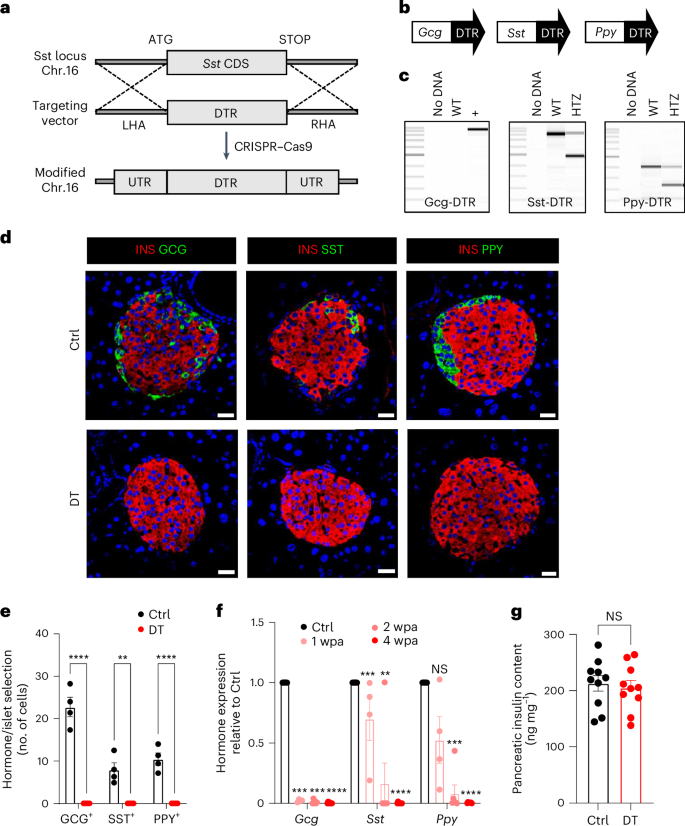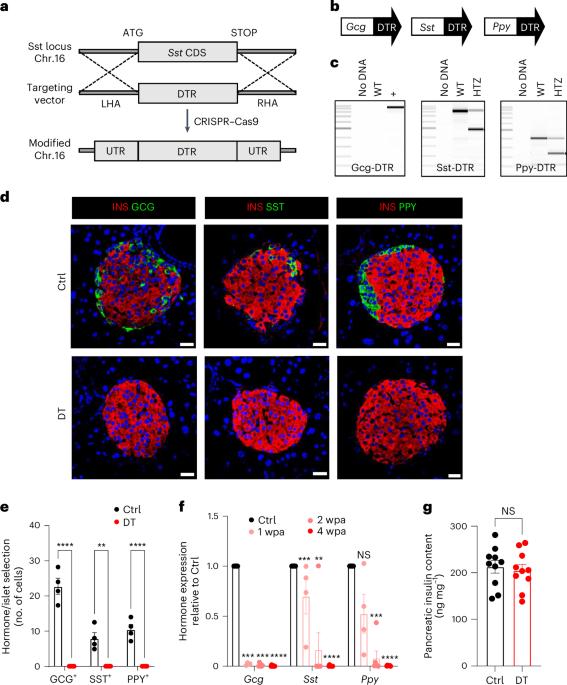仅含β细胞的胰岛在体内调节和适应性分泌胰岛素。
IF 18.9
1区 医学
Q1 ENDOCRINOLOGY & METABOLISM
引用次数: 0
摘要
胰岛中分泌胰岛素的 β 细胞受全身线索的调节,在局部则受邻近的分泌胰岛激素的 "非 β 细胞"(即 α 细胞、δ 细胞和 γ 细胞)的调节。然而,非β细胞是否是准确分泌胰岛素所必需的细胞尚不清楚。在这里,我们研究了成年胰岛完全由β细胞组成的小鼠和仅含有原始β细胞的人类假小细胞。缺乏非β细胞的小鼠在高脂饮食条件下具有最佳的血糖调节能力、更强的葡萄糖耐量和胰岛素敏感性,并且体重增加受到限制。仅由β细胞组成的胰岛的胰岛素分泌动态与完整胰岛的胰岛素分泌动态相当。同样,人β细胞假小体也保留了整个胰岛的葡萄糖调节线粒体呼吸、胰岛素分泌和外显素-4反应。研究结果表明,非β细胞对血糖平衡和β细胞功能是不可或缺的。这些结果支持了旨在开发糖尿病治疗方法的努力,即通过体外分化的多能干细胞或在原位将非β细胞重编程为胰岛素生产者等方法,生成不含非β细胞的β样簇。本文章由计算机程序翻译,如有差异,请以英文原文为准。


Regulated and adaptive in vivo insulin secretion from islets only containing β-cells
Insulin-producing β-cells in pancreatic islets are regulated by systemic cues and, locally, by adjacent islet hormone-producing ‘non-β-cells’ (namely α-cells, δ-cells and γ-cells). Yet whether the non-β-cells are required for accurate insulin secretion is unclear. Here, we studied mice in which adult islets are exclusively composed of β-cells and human pseudoislets containing only primary β-cells. Mice lacking non-β-cells had optimal blood glucose regulation, enhanced glucose tolerance, insulin sensitivity and restricted body weight gain under a high-fat diet. The insulin secretion dynamics in islets composed of only β-cells was comparable to that in intact islets. Similarly, human β-cell pseudoislets retained the glucose-regulated mitochondrial respiration, insulin secretion and exendin-4 responses of entire islets. The findings indicate that non-β-cells are dispensable for blood glucose homeostasis and β-cell function. These results support efforts aimed at developing diabetes treatments by generating β-like clusters devoid of non-β-cells, such as from pluripotent stem cells differentiated in vitro or by reprograming non-β-cells into insulin producers in situ. Pancreatic islet β-cells can regulate insulin secretion in vivo, even in the absence of non-β-cells.
求助全文
通过发布文献求助,成功后即可免费获取论文全文。
去求助
来源期刊

Nature metabolism
ENDOCRINOLOGY & METABOLISM-
CiteScore
27.50
自引率
2.40%
发文量
170
期刊介绍:
Nature Metabolism is a peer-reviewed scientific journal that covers a broad range of topics in metabolism research. It aims to advance the understanding of metabolic and homeostatic processes at a cellular and physiological level. The journal publishes research from various fields, including fundamental cell biology, basic biomedical and translational research, and integrative physiology. It focuses on how cellular metabolism affects cellular function, the physiology and homeostasis of organs and tissues, and the regulation of organismal energy homeostasis. It also investigates the molecular pathophysiology of metabolic diseases such as diabetes and obesity, as well as their treatment. Nature Metabolism follows the standards of other Nature-branded journals, with a dedicated team of professional editors, rigorous peer-review process, high standards of copy-editing and production, swift publication, and editorial independence. The journal has a high impact factor, has a certain influence in the international area, and is deeply concerned and cited by the majority of scholars.
 求助内容:
求助内容: 应助结果提醒方式:
应助结果提醒方式:


